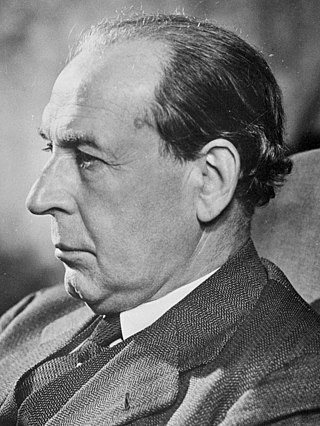Related Research Articles

The 1938 New Zealand general election was a nationwide vote to determine the shape of the New Zealand Parliament's 26th term. It resulted in the governing Labour Party being re-elected in a landslide, winning nearly 56% of the vote despite not gaining any more seats. Having replaced the United-Reform coalition, the newly founded National Party also gained a certain amount of ground.
The 1938 Barnsley by-election was a by-election held on 16 June 1938 for the British House of Commons constituency of Barnsley in what was then the West Riding of Yorkshire.
The 1939 East Norfolk by-election was a parliamentary by-election held on 26 January 1939 for the British House of Commons constituency of East Norfolk.
The 1935 Combined Scottish Universities by-election was a by-election held from 17 to 22 June 1935 for the Combined Scottish Universities, a university constituency of the British House of Commons.

The 1938 Combined Scottish Universities by-election was a by-election held from 21 to 25 February 1938 for the Combined Scottish Universities, a university constituency of the British House of Commons.
The 1934 Combined Scottish Universities by-election was a by-election held from 7 to 12 March 1934 for the Combined Scottish Universities, a university constituency of the British House of Commons.

Onehunga, initially with the formal name of Town of Onehunga, is a former New Zealand parliamentary electorate in the south of the city of Auckland. Between 1861 and 1881, and between 1938 and 1996, it was represented by seven Members of Parliament. It was a stronghold for the Labour Party.
The 1938 City of London by-election was a by-election held on 6 April 1938 for the British House of Commons constituency of City of London, which covered the "Square Mile" which was the United Kingdom's traditional financial district.
The 1940 City of London by-election was a by-election held on 5 February 1940 for the British House of Commons constituency of City of London, which covered the "Square Mile" which was the United Kingdom's traditional financial district.
The 1938 Walsall by-election was a parliamentary by-election held for the British House of Commons constituency of Walsall on 16 November 1938. The by-election was caused by the death of the sitting Liberal National Member of Parliament, Joseph Leckie. The election was won by George Schuster, a fellow Liberal National.

Parliamentary elections were held in Germany on 10 April 1938. They were the final elections to the Reichstag during Nazi rule and took the form of a single-question referendum asking whether voters approved of a single list of Nazi and pro-Nazi guest candidates for the 814-member Reichstag, as well as the recent annexation of Austria. Turnout in the election was officially 99.6% with 99.1% voting 'yes' in Germany and Austria.
Members of the New South Wales Legislative Assembly who served in the 32nd parliament held their seats from 1938 to 1941. They were elected at the 1938 state election, and at by-elections. The Speaker was Reginald Weaver.
Oroua was a parliamentary electorate in the Manawatū-Whanganui region of New Zealand from 1902 to 1938.
Manawatu was a parliamentary electorate in the Manawatū-Whanganui region of New Zealand that existed during three periods between 1871 and 1996.

Elections were held on municipal, provincial, republican and federal levels in Yugoslavia from its foundation in 1918 throughout its breakup in 1992.

The Reichstag, officially the Greater German Reichstag after 1938, was the national parliament of Nazi Germany from 1933 to 1945. Following the Nazi seizure of power and the enactment of the Enabling Act of 1933, it functioned purely as a rubber stamp for the actions of Adolf Hitler's dictatorship — always by unanimous consent — and as a forum to listen to Hitler's speeches. In this purely ceremonial role, the Reichstag convened only 20 times, the last on 26 April 1942. The President of the Reichstag throughout this period was Hermann Göring.
The 1911 Ross and Cromarty by-election was a Parliamentary by-election held on 14 June 1911. It returned one Member of Parliament (MP) to the House of Commons of the Parliament of the United Kingdom, elected by the first past the post voting system.

The 1938 Dartford by-election was held on 7 November 1938. The by-election was held due to the death of the incumbent Conservative MP, Frank Edward Clarke. It was won by the Labour candidate Jennie Adamson. Adamson afterwards stated that she won, because the voters "were ashamed of Mr. Chamberlain's betrayal of Czechoslovakia and of democracy." This was in reference to the Munich Pact, in which the United Kingdom under Prime Minister Chamberlain, accepted Nazi Germany's annexation of the Sudetenland in Czechoslovakia.
The 1938 Pontypridd by-election was held on 11 February 1938. The by-election was held due to the death of the incumbent Labour MP, David Lewis Davies. It was won by the Labour candidate Arthur Pearson.

In Czechoslovakia the first parliamentary elections to the National Assembly were held in 1920, two years after the country came into existence. They followed the adoption of the 1920 constitution. Prior to the elections, a legislature had been formed under the name Revolutionary National Assembly, composed of the Czech deputies elected in 1911 in Cisleithania, Slovak deputies elected in Hungary in 1910 and other co-opted deputies.
References
- ↑ Craig, F. W. S. (1983) [1969]. British parliamentary election results 1918–1949 (3rd ed.). Chichester: Parliamentary Research Services. pp. 18, 54. ISBN 0-900178-06-X.